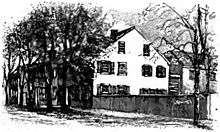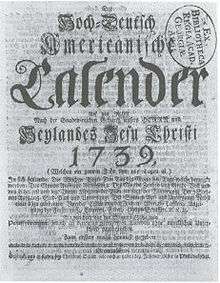Christopher Sower (elder)

Christopher Sower (German: Christophe Saur; 1693 in Laasphe, near Marburg, Germany – 25 September 1758 in Germantown, Pennsylvania) was a printer. He printed and published the first German-language Bible in America, the second printing of a Bible in North America.[2][3]
Biography
Sower wrote his name 'Christophe Saur' on his German publications. He was a graduate of a German university, and studied medicine at the University of Halle. He emigrated to Philadelphia in 1724, and settled in Lancaster County as a farmer.[4] In 1731, Sower's wife, Maria Christina, joined Johann Conrad Beissel's Seventh Day Baptist community at Ephrata.[5] She was known in Ephrata as Sister Marcella, and eventually became sub-prioress of the community. In 1744, she was persuaded to return to her husband and family. But in 1731, Maria Christina's decision disabled Sower's farming operation,[6] and he moved with his son to Germantown where that same year he built a large dwelling for his residence.[5] In order to supply the needs of other German-speaking people in the colonies who were liberally educated, especially in theology, he obtained Bibles and religious works from Germany.[7]

In 1738,[8] having obtained a printing press and supplies, he published a 24-page almanac, in German. It was continued by his descendants till 1798. In 1739 he brought out the first number of Der Hoch-Deutsch Pensylvanische Geschichts-Schreiber, a religious and secular journal, a small folio, 9 inches (230 mm) by 13 inches (330 mm), which attained a circulation of nearly 10,000, and had great influence among his countrymen. It was the first of its kind that was published in a foreign language in Pennsylvania. This was followed by a number of larger works and in 1743 by a quarto edition of the Bible in high German, Luther's translation, which was limited to 1,200 copies of 1,284 pages. It was three years in press, the largest work as yet issued in the colonies, and was the first Bible printed in the American colonies, with the exception of John Eliot's Indian Bible. Thereafter his publications were very numerous, both in English and German.[7] When he began printing, he also established the first type foundry in the colonies, and a manufactory for printer's ink. He afterward made his own paper, bound his own books, and was the inventor of many things of practical use in his business. In addition to farming and printing, he practiced medicine, and manufactured tall eight-day clocks.[4] He was an agent for Franklin cast-iron stoves. He learned clock making and the concoction of herbal medicines from Christopher Witt, a remnant of Johann Kelpius' society.[6]
He was politically active, and frequently represented his countrymen in their intercourse with the government.[4] He supported separation of church and state, pacifism and low taxes. He never affiliated with any religious organization.[5] Upon his death, his business and his estate were inherited by his son, also named Christopher Sower.[9]
see also
References
- ↑ Chistopher Sower House site at ushistory.org
- ↑ Packard, Frederick Adolphus (1837). The Union Bible dictionary. American Sunday-School Union. p. 552. Retrieved 16 November 2010.
- ↑ Watson, John (2009-12-01). Annals of Philadelphia and Pennsylvania in Olden Time. Applewood Books. p. 399. ISBN 978-1-4290-2227-9. Retrieved 16 November 2010.
- 1 2 3
 Wilson, James Grant; Fiske, John, eds. (1900). "Sower, Christopher". Appletons' Cyclopædia of American Biography. New York: D. Appleton.
Wilson, James Grant; Fiske, John, eds. (1900). "Sower, Christopher". Appletons' Cyclopædia of American Biography. New York: D. Appleton. - 1 2 3 John B. Frantz (1999). "Sower, Christopher, II". American National Biography. New York: Oxford University Press.
- 1 2 George Harvey Genzmer (1928–1990). "Sower, Christopher (1693 – September 25, 1758)". Dictionary of American Biography. New York: Charles Scribner's Sons.
- 1 2 Ripley, George; Dana, Charles Anderson (1862). "Type". The new American cyclopaedia: a popular dictionary of general knowledge 15. D. Appleton and Company. p. 690. Retrieved 19 November 2010.
- ↑ William S. Reese (1990), The First Hundred Years of Printing in British North America: Printers and Collectors, American Antiquarian Society
- ↑ Freedley, Edwin (2009-11-28). Philadelphia and Its Manufactures. Applewood Books. pp. 151–153. ISBN 978-1-4290-2226-2. Retrieved 2010-11-21.
Further reading
- Durnbaugh, Donald F. (1958) "Christopher Sauer Pennsylvania-German Printer: His Youth in Germany and Later Relationships with Europe." Pennsylvania Magazine of History and Biography (1958): 316-340.
- Durnbaugh, Donald F. (1969) "Was Christopher Sauer a Dunker?" Pennsylvania Magazine of History and Biography (1969): 383-391. onlineonline
- Frantz, John B. (1999). "Sower, Christopher, II". American National Biography New York: Oxford University Press; [ online]
- Genzmer, George Harvey. "Sower, Christopher (1693 – September 25, 1758)". Dictionary of American Biography (Charles Scribner's Sons)
- Leaman, Hans. (2014) "Johann Christoph Sauer was the most active publisher of German-language print in colonial America. Through his publishing work, based in Germantown, Pennsylvania, he became the mouthpiece for many German immigrants’ opinions on the political and religious controversies of the mid-eighteenth century." online
- Oller, Anna Kathryn. (1963) "Christopher Saur, Colonial Printer: A Study of the Publications of the Press, 1738-1758,” Ph.D. diss. (University of Michigan, 1963)
- Steckel, William R. Pietist in Colonial Pennsylvania: Christopher Sauer, Printer, 1738-1758 (Stanford., 1949)
External links
 "Sower, Christopher". Encyclopedia Americana. 1920. This work cites the following references:
"Sower, Christopher". Encyclopedia Americana. 1920. This work cites the following references:
- Thomas, History of Printing in America (1870)
- Ringwalt, Encyclopædia of Printing (1871)
 "Sower, Christopher". New International Encyclopedia. 1905.
"Sower, Christopher". New International Encyclopedia. 1905.
|